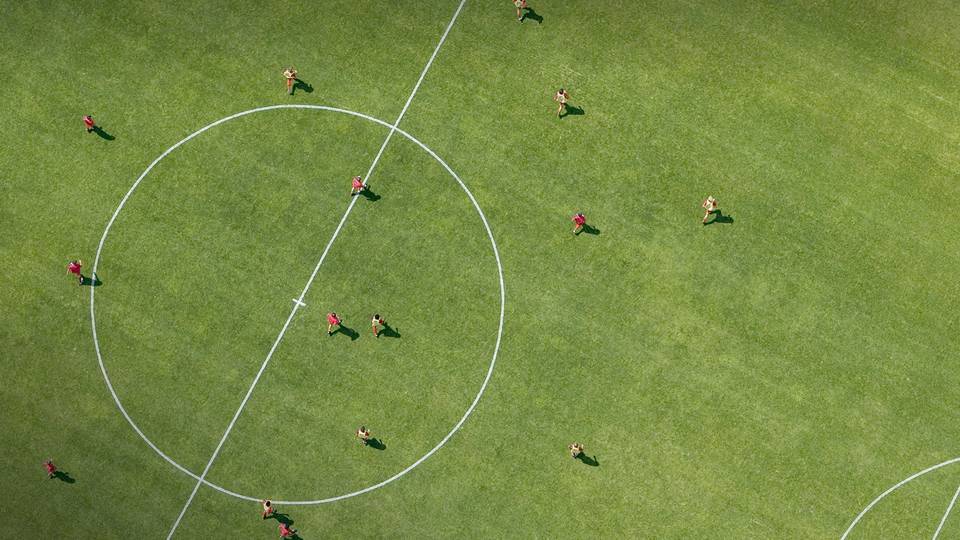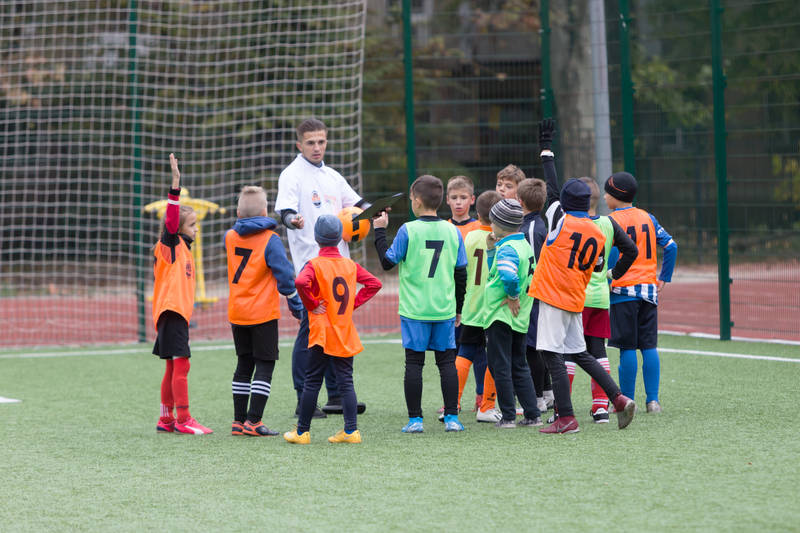Developing effective football drills for Under-7 players requires understanding the unique needs of young athletes. At this age, children are just beginning to grasp the fundamentals of the sport while maintaining their natural enthusiasm for play and movement. Well-designed U7 football drills combine skill development with engaging activities that keep young players interested and actively participating throughout training sessions.
Fun is an essential component of coaching at this level, as it establishes a positive relationship with the sport that can last a lifetime. Drills like "Extreme Tag" focus on dribbling skills while incorporating playful competition that children naturally enjoy. Setting up simple cone patterns for players to navigate helps develop basic ball control while improving coordination and spatial awareness.
Effective U7 coaching balances technical instruction with game-based learning. Rather than lengthy explanations, young players benefit from brief demonstrations followed by plenty of hands-on practice. Activities that involve receiving, turning, and dribbling form the foundation upon which more advanced soccer skills will later develop, making these fundamental drills crucial for early player development.
Fundamentals of U7 Football Coaching
Coaching seven-year-olds requires focusing on core skills that build a solid foundation for their football development. These young players need structured activities that emphasise basic techniques while maintaining a fun, engaging environment.
Importance of Ball Control
Ball control forms the cornerstone of youth football development. At U7 level, players should spend significant time with the ball at their feet, developing a comfortable relationship with it.
Simple dribbling exercises like "follow the leader" help children become familiar with moving while controlling the ball. One effective drill involves setting up small gates (two cones) and having players dribble through them at their own pace.
Use the "ball mastery square" where each player has a ball inside a marked area, practising different touches including sole rolls, inside/outside touches, and stopping/starting on command.
Coaching points should emphasise soft touches, keeping the ball close, and using both feet. Remember that at this age, ball control is more important than passing patterns or team tactics.
Developing Coordination and Motor Skills
Young footballers at U7 need activities that enhance their basic motor functions. Their physical development directly impacts their ability to control the ball and execute simple football movements.
Balance exercises like standing on one leg while passing a ball are excellent for building stability. Include agility ladder drills to improve footwork and spatial awareness - these can be made football-specific by having players dribble to the ladder, perform the footwork, then continue dribbling.
Simple obstacle courses that combine running, jumping, turning and ball skills provide comprehensive motor development. These might include weaving through cones, hopping over small hurdles, and finishing with a shot on goal.
Movement games like "red light, green light" with a ball teach control and reaction time. Tag games where players must dribble while evading taggers combine fun with essential skill building.
Key Offensive Drills for U7 Players
Developing offensive skills in young footballers requires age-appropriate drills that build fundamental abilities while keeping children engaged. The following exercises focus on essential passing techniques and attack strategies tailored specifically for U7 players.
Passing Techniques and Games
Practicing passes through fun games helps young players develop critical skills. The "Pass and Follow" drill is excellent for beginners - arrange players in a simple square, with each child passing to a teammate and then following their pass to the next position. This teaches basic movement after passing.
"Gates Passing" is another effective drill. Set up small cone gates around the playing area and challenge pairs of players to pass through as many gates as possible in one minute. This improves accuracy and encourages communication.
The popular "Hot Potato" game involves players standing in a circle, passing quickly to teammates. When the coach shouts "hot," the player with the ball must perform a specific skill like a toe tap. This builds quick thinking and ball control.
Attack Strategies for Young Footballers
At U7 level, simple attack concepts focused on fun are most effective. "Sharks and Minnows" is brilliant for developing dribbling under pressure. One or two defenders (sharks) try to tag dribblers (minnows) as they cross from one side of a marked area to another.
"Attack the Goal" sets up a simple scenario where attackers take turns to dribble around cones before shooting. This builds the connection between dribbling and finishing.
For group attack skills, try "Numbers Football." Assign each player a number and call out 2-3 numbers to create mini-teams who attack against a goalkeeper. This teaches spontaneous attacking combinations while keeping players alert and engaged.
"Follow the Leader" is effective too - one player dribbles creatively while teammates follow, copying the movements. This builds creativity and close control in fun, unpredictable patterns that mirror real match situations.
Integrating Fun Into U7 Practice Sessions
Creating enjoyable and engaging training sessions is vital for young players' development and continued interest in football. The right approach combines skill-building with playful activities that keep children motivated while learning.
Using Poles and Cones in Drills
Poles and cones are invaluable tools for creating exciting U7 drills that develop fundamental motor skills. Set up slalom courses where players dribble in and out of poles to improve close control and coordination. This basic exercise can be transformed into a "Dragon's Tail" game where coaches pretend the ball is a dragon that needs careful guidance through a magical forest.
Create simple relay races using cones as markers. Teams can compete to dribble around a cone and back, passing to the next teammate. This builds both technical skills and teamwork.
For balance development, place poles flat on the ground as "rivers" that players must jump over while controlling their ball. Vary the width between poles to challenge different jumping abilities.
Small-Sided Games for Enjoyable Learning
Small-sided games provide the perfect balance of fun and learning for U7 players. 2v2 or 3v3 matches ensure maximum ball touches and involvement for every child. These mini-games naturally teach spacing, teamwork and decision-making in a context children love.
Add creative elements to these games to enhance enjoyment. "Pirate Ship" involves designating areas as "islands" where players are safe from the coach (the pirate). This encourages quick movement and spatial awareness.
"Goal Fest" uses multiple small goals rather than just two, creating excitement as players can score in any direction. This prevents bunching and encourages looking up to spot opportunities.
Time-limited challenges work brilliantly with this age group. "Two-Minute Tournament" creates short, high-energy matches where teams rotate frequently, maintaining enthusiasm and focus throughout the session.
Building a Supportive Football Community
A strong support system is essential for young players at the U7 level to thrive and develop their football skills. The adults involved and the team atmosphere significantly impact how children experience the sport during these formative years.
Role of Adult Members in Youth Development
Parents and coaches serve as the backbone of any successful youth development programme. Adults should focus on creating a learning environment where mistakes are seen as growth opportunities rather than failures. Coaches must receive proper training to understand the developmental needs of 7-year-olds.
Volunteer participation from parents strengthens the club structure and shows children the value of community involvement. Consider establishing a parent liaison role to improve communication between families and coaching staff.
Regular feedback sessions help adult members understand their impact on young players' development. These conversations should focus on positive reinforcement techniques and age-appropriate expectations.
Adult members should commit to ongoing education about child development in sport contexts. Many UK football associations offer specialised courses for those working with U7 players.
Creating a Positive Team Environment
Young players thrive in environments where enjoyment takes priority over winning. Coaches should implement a "equal playing time" policy to ensure all children feel valued regardless of ability level.
Establishing simple team rituals like pre-match huddles or post-practice high-fives builds camaraderie. These small traditions create a sense of belonging that's particularly important at this age.
Organise occasional social events outside regular training to strengthen relationships between families. These gatherings help create the community feeling that often keeps children engaged with soccer over the long term.
Celebrate individual improvements rather than just match results. Recognition systems that acknowledge effort, good sportsmanship and personal achievements motivate young players effectively.
Encourage players to support each other through partner activities and team challenges. This peer support system develops communication skills and empathy alongside football abilities.












